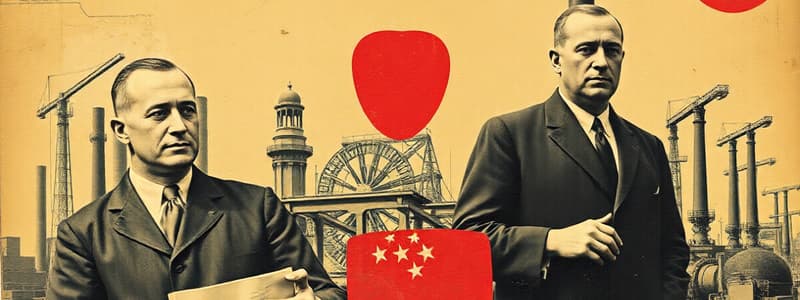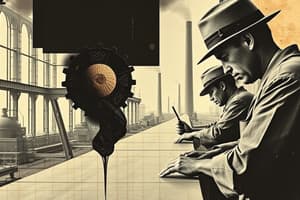Podcast
Questions and Answers
What innovation is Gustavus Swift credited with inventing?
What innovation is Gustavus Swift credited with inventing?
Which act was criticized for having too many loopholes that businessmen could exploit?
Which act was criticized for having too many loopholes that businessmen could exploit?
What was a significant outcome of the Haymarket Riot?
What was a significant outcome of the Haymarket Riot?
Who founded a steel company in Pittsburgh?
Who founded a steel company in Pittsburgh?
Signup and view all the answers
Which of the following is a definition of a monopoly?
Which of the following is a definition of a monopoly?
Signup and view all the answers
What significant invention is credited to Thomas Edison?
What significant invention is credited to Thomas Edison?
Signup and view all the answers
What was the primary demand of the Knights of Labor?
What was the primary demand of the Knights of Labor?
Signup and view all the answers
What was the purpose of discounts offered to certain customers, commonly known as rebates?
What was the purpose of discounts offered to certain customers, commonly known as rebates?
Signup and view all the answers
Study Notes
Key Figures and Inventions
- Cornelius Vanderbilt: Specialized in owning railroad tracks.
- J.P. Morgan: Specialized in selling large stock blocks to investment bankers.
- Andrew Carnegie: Founded a steel company in Pittsburgh.
- John D. Rockefeller: Operated Standard Oil.
- Haymarket Riot: Workers strike at McCormick Harvester; police shoot/kill four workers.
- Homestead Strike: Pinkerton Agents killed workers at Andrew Carnegie's plant.
- Pullman Strike: Workers' pay cut; rent kept same; ordered to stop for violating Sherman Anti-Trust Act.
- Natural Resources: Country's industrial success relied heavily on them.
- Sherman Anti-Trust Act: Law with loopholes that didn't effectively control monopolies.
- Knights of Labor: Organization aiming to end child labor, punish strikebreakers, and regulate markets.
- Typewriter: Invented by Christopher Sholes.
- Refrigerated RR Car: Invented by Gustavus Swift.
- Patent: License for a new invention.
- Rebate: Discount for certain customers.
- Monopolies: A single company controlling all aspects of an industry, from raw materials to finished product.
- Telephone: Invented by Alexander Graham Bell.
- Network: System of interconnected elements (e.g., rail lines).
- Assembly Line: Henry Ford's revolutionary factory process.
- Airplane: Invented by Orville and Wilbur Wright.
- Underwater Cable: Invented by Cyrus Field.
- Stock: Shares of a business.
- Kodak Cameras: Invented by George Eastman.
- Lightbulb: Invented by Thomas Edison.
Important Historical Events
- Haymarket Riot (E): Workers at McCormick Harvester went on strike; police killed workers.
- Homestead Strike (F): Pinkerton agents killed workers at Andrew Carnegie's plant.
- Pullman Strike (G): Workers facing pay cuts and inflexible rent payments; federal intervention occurred.
- Natural Resources (H): Country's industrial success relied on these resources.
- Sherman Anti-Trust Act (I): Law aimed to prevent monopolies, with weaknesses that made it ineffective.
Topics for Further Study
- Triangle Shirtwaist Company: Study how its tragic fire drastically altered public opinion on working conditions.
- Mother Jones: Research her significant role in the labor movement.
Studying That Suits You
Use AI to generate personalized quizzes and flashcards to suit your learning preferences.
Description
Explore the significant personalities and inventions that shaped American industry in the late 19th and early 20th centuries. This quiz covers influential figures like Cornelius Vanderbilt and Andrew Carnegie, important labor strikes, and key technological inventions. Test your knowledge of how these elements contributed to industrial growth.




